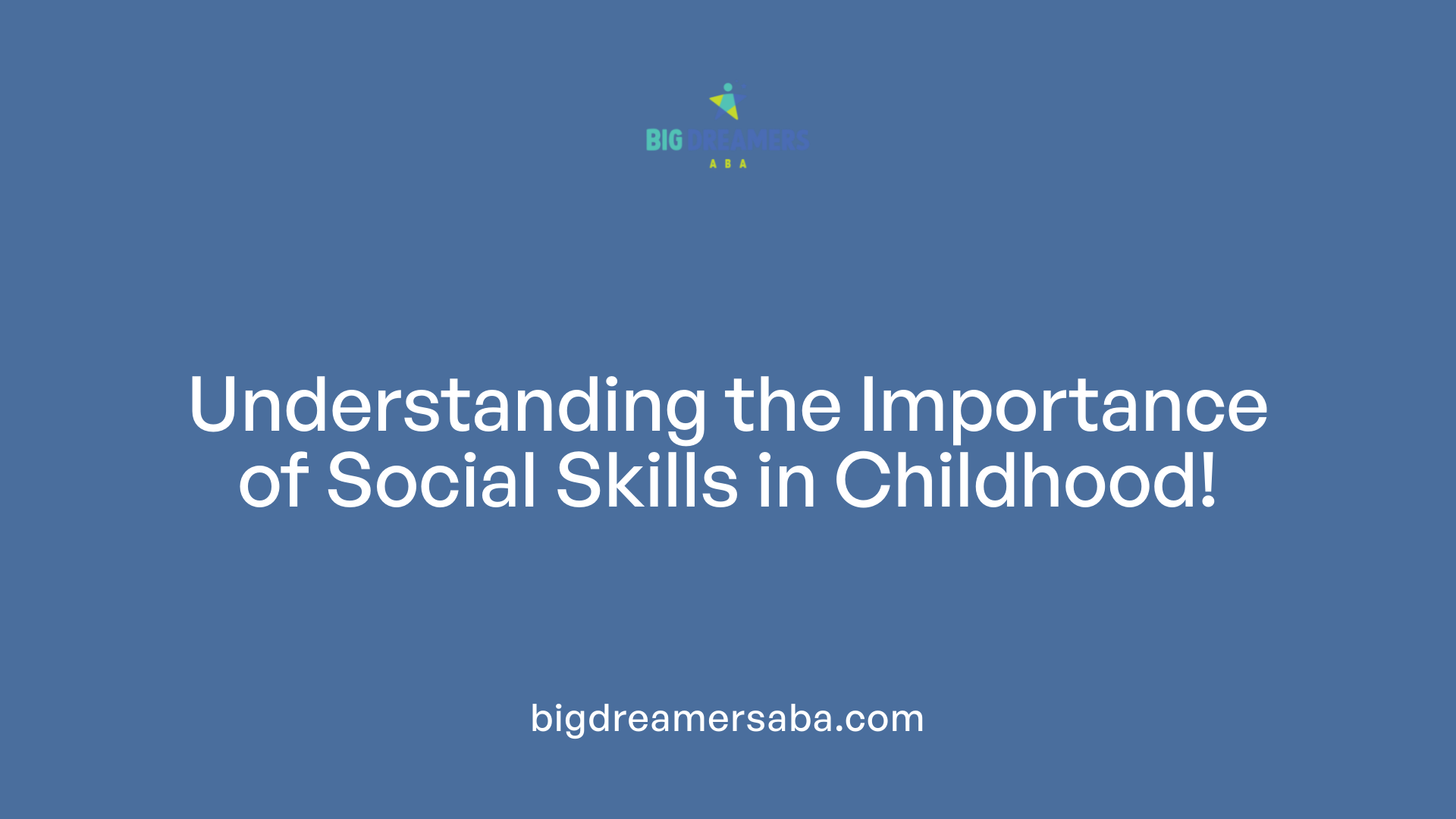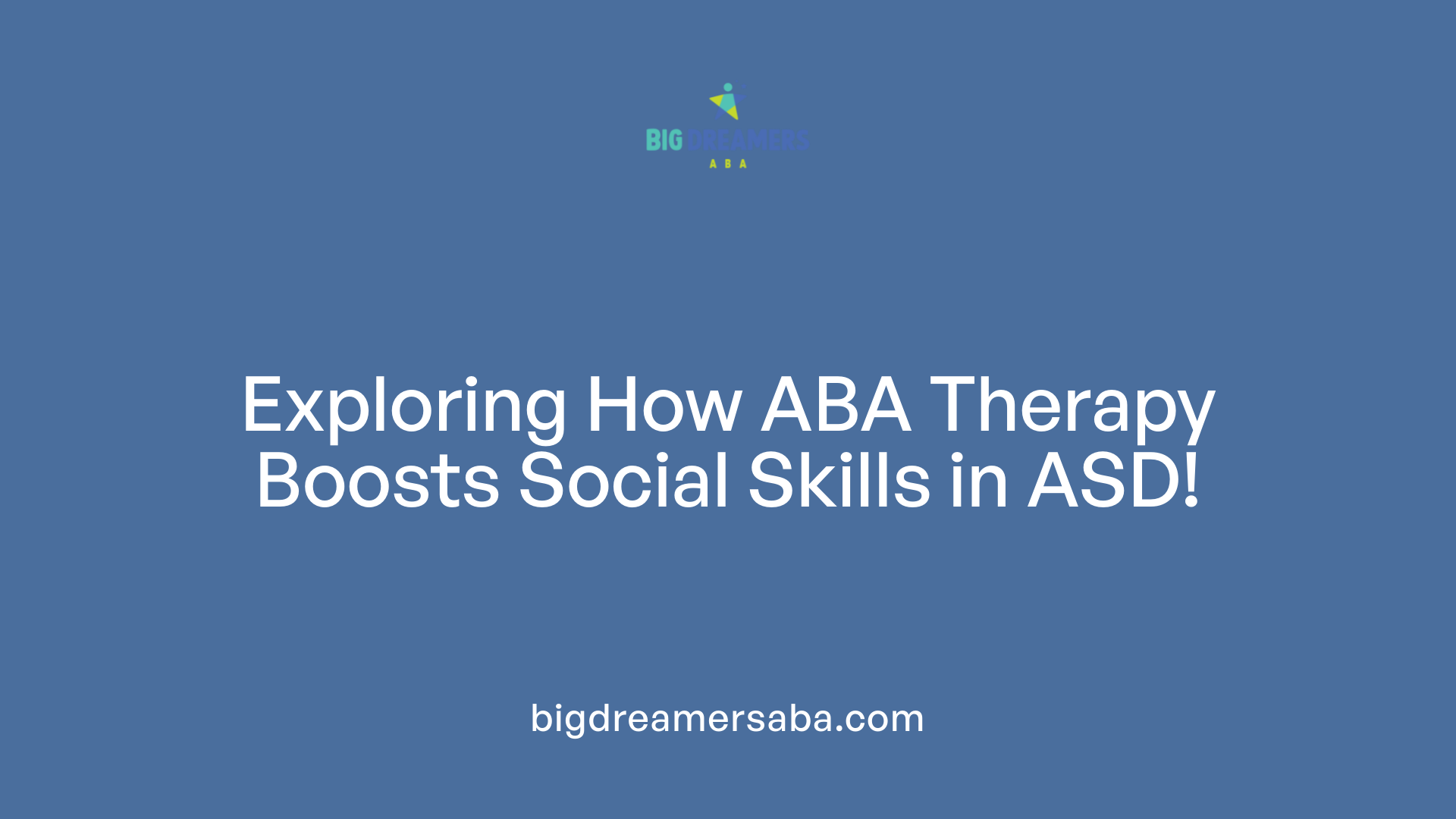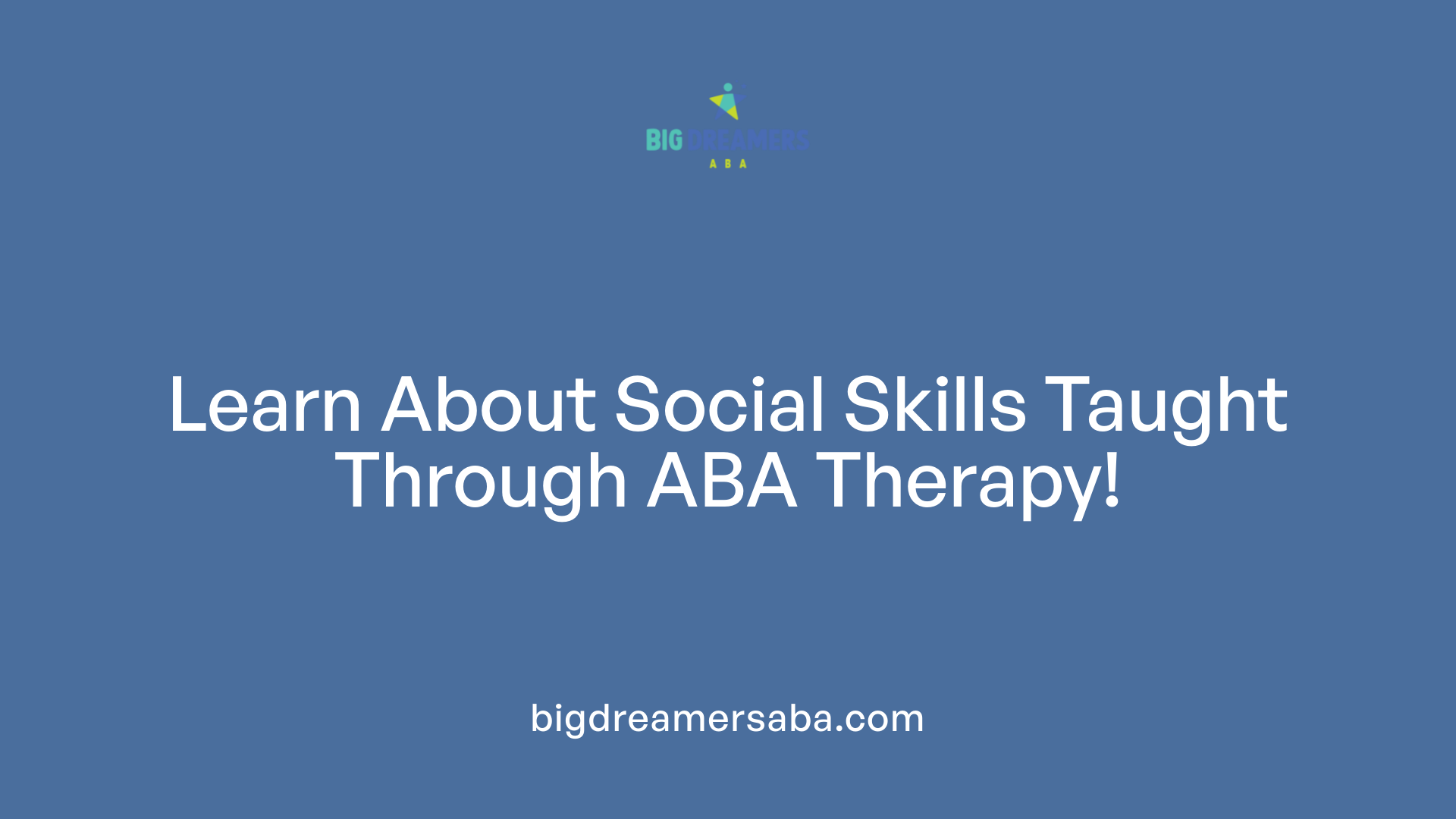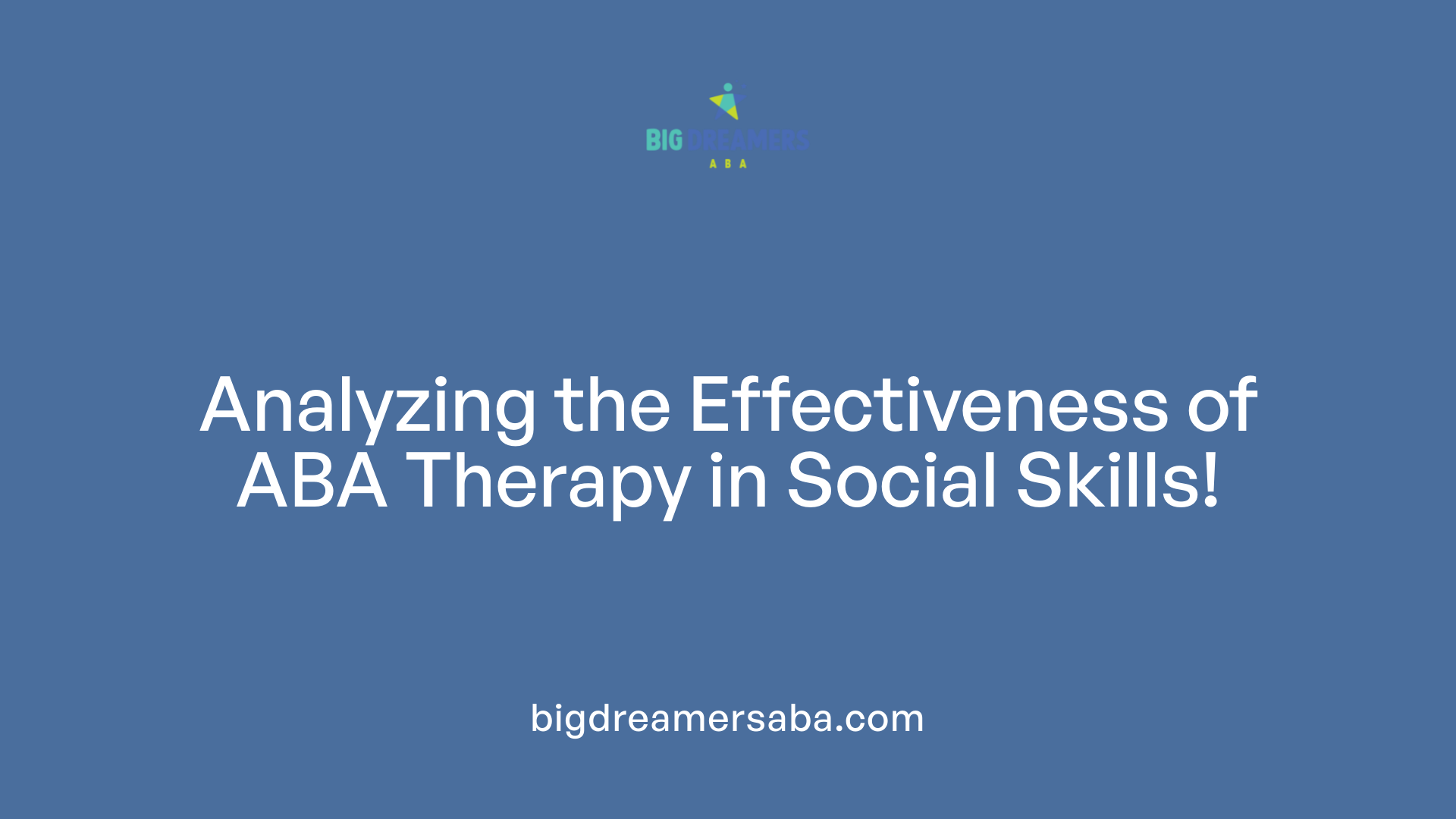How ABA Therapy Supports Social Skills Development
Uncovering the Role of ABA Therapy in Social Skills Advancement for Autism

Exploring the Intersection of ABA Therapy and Social Development
Social skills are pivotal elements of early childhood development, providing children with the tools to foster friendships, effectively communicate, and participate in communal environments. For children with autism, these skills can be particularly challenging to acquire and yet are essential for personal development and integration. Applied Behavior Analysis (ABA) therapy has emerged as a powerful, evidence-based intervention that supports the development of social skills in children with autism by employing structured methodologies tailored to individual needs.
The Significance of Social Skills in Early Development

What is the importance of social skills in early childhood development?
Social skills are vital in early childhood development as they form the foundation for children to build positive relationships and effectively navigate social environments. Through play and interaction with peers and caregivers, children learn essential abilities such as sharing, cooperation, and empathy, which are crucial for resolving conflicts and understanding emotions.
Children with strong social skills tend to have better communication abilities, which play a significant role in expressing thoughts and emotions. This expressive capacity enhances their ability to engage with others in meaningful ways, fostering connections that lead to lasting friendships. Furthermore, well-developed social skills boost children's confidence, improve their school readiness, and enhance their adaptation to academic settings—factors that can lead to greater overall academic performance.
On the other hand, the absence of these skills can lead to difficulties in relationships, feelings of loneliness, and potential behavioral issues later in life. Thus, incorporating social skills training in early education, especially for children facing challenges, is crucial. Ultimately, strong social skills contribute to better mental health, academic success, and a smoother transition into adulthood.
How ABA Therapy Enhances Social Skills in Autism Spectrum Disorder (ASD)

How does ABA therapy enhance social skills in individuals with autism?
ABA therapy significantly enhances social skills in individuals with autism by employing structured, evidence-based strategies. These strategies break down complex social behaviors into smaller, more manageable tasks, facilitating mastery at each stage. Key techniques include:
- Discrete Trial Training (DTT): This method involves teaching social skills step-by-step, allowing children to practice and consolidate each component before moving onto the next.
- Modeling: Therapists demonstrate appropriate social behaviors for children to observe and imitate, helping them learn through example.
- Role-Playing: This technique provides a safe environment for children to practice new skills in various scenarios, giving them the opportunity to receive constructive feedback.
- Natural Environment Training (NET): Learning is embedded within everyday activities to encourage generalization of skills in real-world contexts.
Through these methods, children improve their communication abilities, both verbal and non-verbal. They learn to interpret social cues and develop essential skills like turn-taking, active listening, and understanding emotional responses.
As a result, ABA therapy also increases self-confidence in social situations, reduces problem behaviors, and fosters meaningful interactions with peers. The individualized nature of this therapy—tailored to each child's unique strengths and deficits—ensures ongoing assessment and adjustment of goals, ultimately empowering children to navigate social realms more effectively and build lasting relationships.
Methodologies in ABA Therapy for Social Skills Development

What methodologies are used in ABA therapy to develop social skills?
ABA therapy utilizes various structured methodologies to enhance social skills among individuals with autism. One prominent approach is Discrete Trial Training (DTT), which breaks down social behaviors into smaller, manageable tasks. This method allows for focused teaching of specific social skills, encouraging repeated practice until mastery is achieved.
Another effective technique is Natural Environment Teaching (NET). This approach emphasizes learning in real-world contexts, helping children apply their skills during everyday activities. By embedding opportunities to practice social interactions in authentic settings, NET supports generalization and retention of learned skills.
Additionally, modeling and role-playing are crucial components of ABA methodologies. In modeling, appropriate social behaviors are demonstrated for children to observe and imitate. Role-playing offers a safe environment for children to practice interactions, allowing them to navigate social scenarios and receive feedback.
Together, these methodologies support skill acquisition in various domains, fostering improved communication, social competence, and overall engagement in community activities. Through consistent practice in structured settings, children gain the confidence and ability to interact successfully in diverse social environments.
Examples of Social Skills Fostered by ABA Therapy

Can you provide examples of specific social skills taught through ABA therapy?
ABA therapy focuses on teaching various essential social skills that enhance interactions and foster connections. These include:
- Making Friends: Strategies to initiate friendships and maintain connections.
- Turn-Taking: Skills necessary for sharing and participating in group activities.
- Reciprocating Greetings: Learning to respond appropriately when acknowledged by peers.
- Maintaining Conversations: Skills to keep dialogue flowing and engage actively with others.
One tailored approach used in ABA therapy is Behavioral Skills Training (BST). This method encompasses:
- Explanation: Discussing the importance of the skill.
- Modeling: Demonstrating the desired behavior.
- Practice: Engaging in the skill alongside the therapist.
- Feedback: Receiving constructive insights for improvement.
To illustrate, an objective might involve a child responding to a greeting by turning towards the person, waving, and saying "hi." This structured learning creates measurable benchmarks to track progress, ensuring children develop these crucial skills in an engaging, effective manner. Additionally, tools like video modeling or interactive games foster engagement while practicing social skills in a playful context, creating a fun and supportive learning environment.
Evaluating the Effectiveness of ABA Therapy in Social Skills Enhancement

How effective is ABA therapy for improving social skills in individuals with autism?
ABA therapy has been shown to be effective in improving social skills in individuals with autism spectrum disorder (ASD) through a structured, evidence-based approach. Research indicates that children receiving ABA interventions see significant enhancements in their social and communicative skills, with studies reporting statistical significance in outcomes (p < .05).
Key techniques such as modeling, role-playing, and positive reinforcement contribute to the learning process by teaching children vital social rules and improving their ability to interact with peers. These methods provide children with opportunities to practice and hone their skills in safe and supportive environments.
Moreover, longitudinal studies suggest that the benefits of ABA therapy extend beyond social skills to positively impact academic performance and the quality of life. For instance, children who develop better communication and social skills through ABA are more likely to engage in classroom activities and maintain friendships, which boosts their emotional well-being and academic motivation.
While there is variability in outcomes depending on individual cases, the overall body of evidence supports the efficacy of ABA therapy in facilitating better social interactions for children with autism. This demonstrates the potential for ABA therapy to be a valuable component of an overarching educational and developmental strategy for children facing social challenges.
Real-World Applications of ABA Therapy in Social Skills Training
What practical applications does ABA therapy have in training social skills?
ABA therapy has several practical applications in training social skills, particularly for children with Autism Spectrum Disorder (ASD). It provides tailored interventions that enhance communication and interaction through personalized strategies like positive reinforcement, role-playing, and modeling.
These methods help children learn to:
- Recognize emotions
- Engage in turn-taking during conversations
- Understand social cues
Moreover, ABA therapy emphasizes learning in natural environments, which enhances generalization and adaptability.
Incorporating Natural Environments in Therapy
By using activities in real-life settings, children practice social skills in contexts where they will apply them, making the learning process more relevant. This approach helps practitioners integrate social skills into everyday situations, allowing for more effective learning experiences.
Strategies for Real-World Interactions
The incorporation of role-playing and modeling techniques allows children to rehearse social interactions in a safe environment. Additionally, group settings are utilized for peer interactions, fostering collaboration and the opportunity to practice social skills within a supported community.
Through these strategies, ABA therapy significantly improves children's ability to form meaningful relationships and navigate social interactions effectively.
Final Thoughts on ABA and Social Skill Development
Through tailored techniques and committed practice, ABA therapy provides a supportive framework for developing social skills in children with autism. By fostering communication, building confidence, and reducing problem behaviors, it lays the groundwork for richer, more meaningful social interactions. These cultivated skills not only improve immediate quality of life but also contribute significantly to future opportunities for children with autism. ABA therapy's evidence-based approaches and personalized strategies represent potent avenues for addressing the social challenges faced by these individuals, enabling them to better navigate the complexities of their environments and achieve greater integration into their communities.
References
- ABA Therapy for Social Skills - Empower Behavioral Health
- Effectively Teaching Social Skills in ABA
- How ABA Therapy Helps with Social Skills - PediaPlex
- Developing Social Skills Through ABA Therapy for Autism
- Enhancing Social Skills Through ABA Therapy
- How ABA Therapy Helps With Social Skills
- ABA Therapy for Improving Social Skills | Level Ahead
- Autism and Social Skills Development
Recent articles

How to Address Sleep Challenges in Children Receiving ABA Therapy

How Big Dreamers ABA Addresses Sensory Processing Challenges
